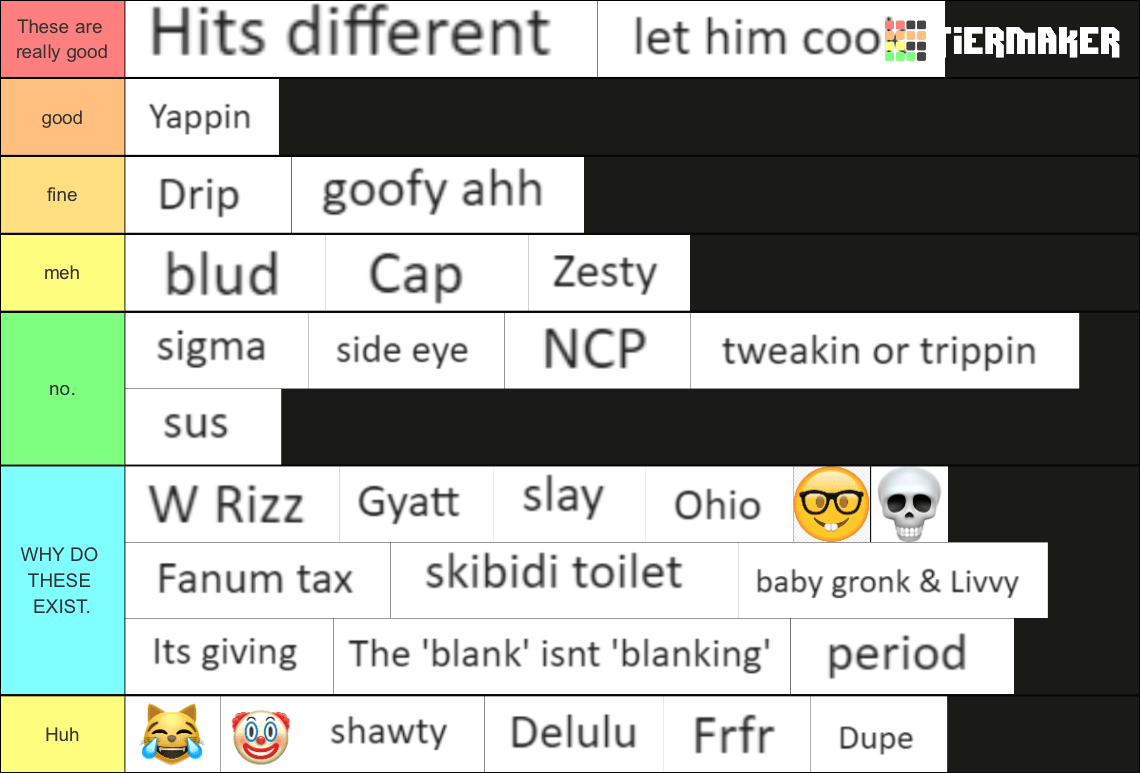Understanding Gen Alpha Slang: The Language Of Tomorrow's Youth
In today's fast-paced digital world, language is constantly evolving, and nowhere is this more evident than in the slang used by Generation Alpha. This cohort, born from 2010 onwards, is growing up in a time defined by advanced technology and social media influence. **Understanding Gen Alpha slang** is essential for parents, educators, and marketers who want to connect with this young audience effectively. The unique linguistic style of Gen Alpha reflects their experiences, values, and the digital environment in which they are immersed.
As Gen Alpha continues to navigate their formative years, they are not only shaping their own identity but also influencing the broader cultural landscape. Their slang is a dynamic mix of creativity, humor, and brevity, often drawing from various sources such as internet memes, gaming culture, and popular media. This article delves into the intricacies of Gen Alpha slang, exploring its origins, significance, and implications for communication in the modern age.
This comprehensive guide aims to equip you with a deeper understanding of Gen Alpha's unique language patterns. By examining key phrases, trends, and the context in which this slang is used, we hope to bridge the generational gap and foster better communication between adults and the youth of today.
Table of Contents
- What Is Gen Alpha Slang?
- Origins of Gen Alpha Slang
- Popular Gen Alpha Slang Phrases
- The Role of Social Media in Gen Alpha Slang
- How Gen Alpha Slang Differs from Previous Generations
- The Impact of Gen Alpha Slang on Communication
- The Future of Gen Alpha Slang
- Conclusion
What Is Gen Alpha Slang?
Gen Alpha slang refers to the informal language and unique expressions used by individuals born between 2010 and 2025. This generation is characterized by their fluency in digital communication and their ability to create and adapt language rapidly. Slang serves as a form of identity and belonging, allowing Gen Alpha to connect with their peers while distinguishing themselves from older generations.
Origins of Gen Alpha Slang
The origins of Gen Alpha slang can be traced back to a combination of factors, including:
- Digital Natives: Growing up with smartphones and tablets has made Gen Alpha adept at using digital platforms, where slang often originates.
- Influence of Social Media: Platforms like TikTok, Instagram, and Snapchat play a significant role in shaping and popularizing new slang terms.
- Globalization: Exposure to diverse cultures through the internet has introduced a variety of linguistic influences into their vernacular.
Popular Gen Alpha Slang Phrases
As with any linguistic trend, specific phrases and terms emerge within Gen Alpha slang. Some popular examples include:
- Bet: Used to affirm or agree with something.
- Flex: To show off or flaunt something, often in a playful manner.
- Vibe check: Evaluating the atmosphere or feelings of a situation or group.
- No cap: A phrase used to emphasize that someone is being truthful.
The Role of Social Media in Gen Alpha Slang
Social media platforms are crucial in the development and dissemination of Gen Alpha slang. These platforms provide a space for creativity and experimentation with language, allowing youth to share and popularize new terms quickly. The viral nature of content on platforms like TikTok can lead to rapid slang evolution, where a term can go from obscurity to widespread use in a matter of days.
Influence of Memes and Trends
Memes often serve as the breeding ground for new slang, with phrases taken from viral content becoming part of everyday language. Trends can shift quickly, leading to a constantly changing lexicon that reflects the interests and humor of this generation.
How Gen Alpha Slang Differs from Previous Generations
When comparing Gen Alpha slang to that of previous generations, several key differences emerge:
- Speed of Evolution: The rapid pace of digital communication means that slang can change much faster than in previous generations.
- Inclusivity and Diversity: Gen Alpha slang often reflects a broader range of cultural influences, making it more inclusive than prior generations.
- Emphasis on Brevity: The character limits on platforms like Twitter and the fast pace of social media have led to a preference for shorter, punchier phrases.
The Impact of Gen Alpha Slang on Communication
Understanding Gen Alpha slang is essential for effective communication with this generation. Parents, educators, and marketers must recognize the significance of this slang in fostering connections:
- Building Rapport: Using familiar slang can help bridge the generational gap and create a sense of understanding.
- Enhancing Engagement: Marketers targeting Gen Alpha can benefit from incorporating relevant slang into their messaging to resonate with this audience.
- Encouraging Expression: Acknowledging and validating the slang used by Gen Alpha can empower them to express themselves more freely.
The Future of Gen Alpha Slang
As Gen Alpha continues to grow and develop, their slang will evolve alongside them. The influence of technology, culture, and social dynamics will shape the language they use, leading to a rich and diverse vocabulary that reflects their experiences. The future of Gen Alpha slang promises to be exciting and unpredictable, with new phrases and trends emerging regularly.
Conclusion
In conclusion, understanding Gen Alpha slang is crucial for anyone looking to connect with this emerging generation. Their unique expressions reflect a blend of digital culture, creativity, and social dynamics that shape their identity. By embracing this language, we can foster better communication and understanding across generations.
We encourage you to engage with the content and share your thoughts in the comments section below. If you found this article informative, consider sharing it with others or exploring more of our content on generational trends.
References
Article Recommendations


